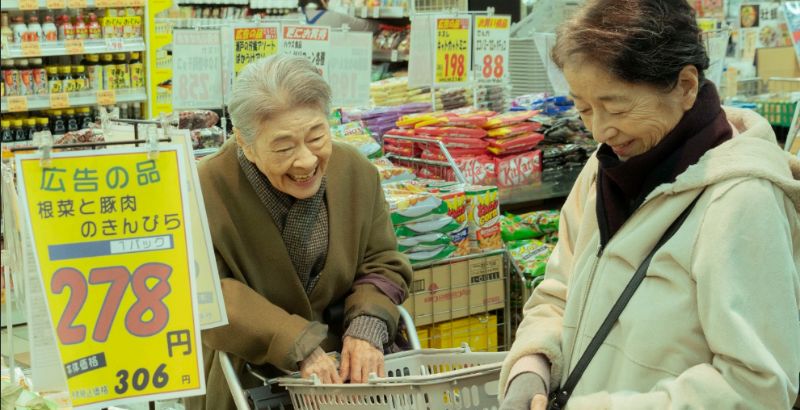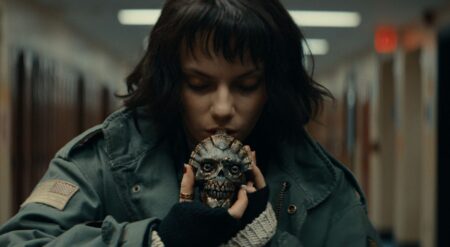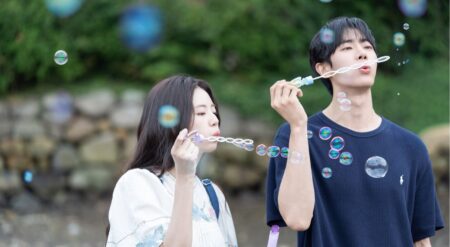
Sobering in its nihilism, and devastating in its pockets of compassion, Plan 75, directed by Chie Hayakawa, refuses to numb the pain. This aching portrait is an exercise in reflection of what happens when society views a population of people as livestock, only good for what they reap and used goods once they’re dependent on the infrastructure they built. This future that Hayakawa and co-screenwriter Jason Gray has written is hardly a work of science fiction. We’ve already seen how the world treats those who require additional care in the form of medical, economic, or social support. Plan 75, based on Hayakawa’s short film of the same name, holds up a magnifying glass to some of society’s most infected sores.
All of that said, Plan 75 isn’t without a heart. The strength of its beat makes the inevitable of the film leave a greater bruise, as we are wrung through by the time the film ends. The premise is so grim and it makes for an often difficult watch. Set in Japan in a near-future date where society has installed a program called “Plan 75” in which anyone 75 or older can apply to be granted assisted death. The decision follows an increase in violent hate crimes against the elderly by a younger society that believes they’re draining the economy. The haunting sequence that starts the film as a nameless man with bloodied hands and a shotgun wandering the desolate halls of a once active retirement facility, a wheelchair overturned in the foreground, declares the narrative intent. This film will leave a mark.
Michi (Chieko Baisho) is a 78-year-old widow, childless and often alone, whose means of survival have been eroding. Visibly collected, her story best blends the background horror of the situation and personal implications. Whose life truly matters in a world where a government would rather eradicate a whole generation rather than find other solutions?
The elderly in Plan 75 aren’t just expendable but are seen as easy targets too. Young people who will guide the applicants from the point of entry to the final decision to end their lives are advised to make sure that the patients they speak to don’t grow anxious as they follow through with death. They’re told that the applicants are often lonely by nature of being elderly, so to be compassionate, and listen with intent, but to still try and make their numbers look good for completed goals.
It’s some of the throwaway lines or developing layers of the story that create some of the bleakest moments. A news broadcast talking about the positive impact the plan has had on the economy making them consider lowering the age to 65 for applicants, to applicants no longer need to list an address. The latter grows worse when you realize it’s added to capitalize on the displaced population while also making it easier for people to apply.
The warmth found is done so through the performances and how the characters are written to still have a sense of humanity, even those who are working within the walls of the company. Baisho is extraordinary. Despite a cool exterior, her eyes give way to such rich interiority that her humanity floods the screen. Inquisitive and attentive, she doesn’t give away too much through dialogue but instead develops the character through delicate touches and hands which hover over the horizon. Hayato Isomura, Stefanie Arianne, and Yumi Kawai are all phenomenal as well in smaller roles that shade on the sidelines of this world.

The score from Rémi Boubal is arresting. Boubal, plus the direction by Hayakawa and cinematography by Hideho Urata come together for a sorrowful atmosphere. The characters, Michi in particular, stand stark and small against backdrops that visualize her perceived insignificance. She’s lived nearly 80 years and, as generations younger than she would argue, she’s already had her time to thrive. That she’s given no alternative makes for a more searing portrait, as her housing complex is to be demolished, and finding jobs at her age is near impossible. All of it culminates to show her further that she has nothing nor no one to turn to, and the friendly voice at the end of the phone, no matter the affiliation with the company that would kill her, is the only one thinking of her best interests.
In many instances, the film is an echo of Hirokazu Koreeda’s After Life. There’s a similar inquisitive delicacy in how both directors depict souls trapped in a moment in time, with Koreeda’s being the space between life and what comes after. The difference is that where the former detailed the instances of someone’s life that would be held dear for eternity, Plan 75 shows what happens when a life is boiled down to a statistic. In this regard, it’s more like Jennifer Phang’s formidable and underseen Advantageous, which similarly eviscerated a government intent on placating the able-bodied working individually while sacrificing others for capitalist success. Both devastate and linger. Plan 75 captures a similar level of attention.
Plan 75, for all of how it seeks to wound you, still manages to show pieces of the world that remain thoughtful. While those in the film may see the elderly characters as statistics, the filmmakers don’t. The result is a tender, melancholy, and breathtaking piece of fiction that captures the essence of finding joy in blink-and-miss moments while hollowing you out. Music, laughter, and shared company all culminate in snapshots of a person’s life that are cherished by the individual, even if outsiders regard them as inconsequential. If Plan 75 does something right (and it does many) it reminds us that every person is affected by a multitude of moments that carry them until their final breaths, no matter how insignificant or grand they’re perceived by someone on the outside looking in.
Plan 75 is playing now in limited release.
Plan 75
-
Rating - 10/1010/10
Tl;DR
Plan 75, for all of how it seeks to wound you, still manages to show pieces of the world that remain thoughtful. While those in the film may see the elderly characters as statistics, the filmmakers don’t. The result is a tender, melancholy, and breathtaking piece of fiction that captures the essence of finding joy in blink-and-miss moments while hollowing you out.






